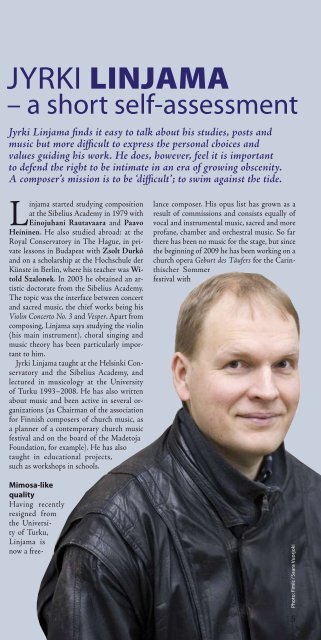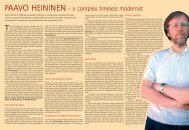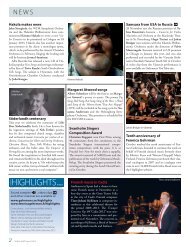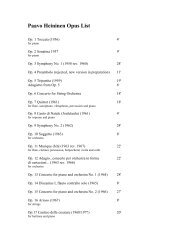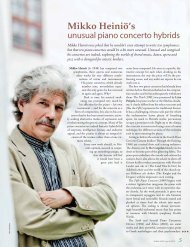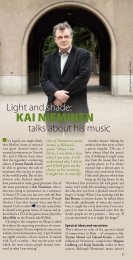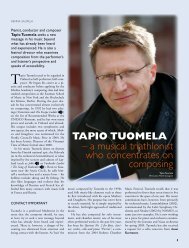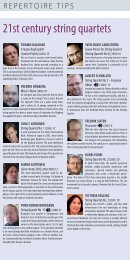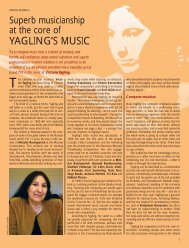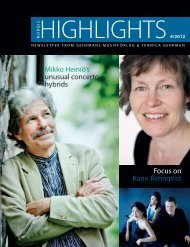JYRKI LINJAMA - Fennica Gehrman
JYRKI LINJAMA - Fennica Gehrman
JYRKI LINJAMA - Fennica Gehrman
Create successful ePaper yourself
Turn your PDF publications into a flip-book with our unique Google optimized e-Paper software.
<strong>JYRKI</strong> <strong>LINJAMA</strong><br />
– a short self-assessment<br />
Jyrki Linjama finds it easy to talk about his studies, posts and<br />
music but more difficult to express the personal choices and<br />
values guiding his work. He does, however, feel it is important<br />
to defend the right to be intimate in an era of growing obscenity.<br />
A composer’s mission is to be ‘difficult’; to swim against the tide.<br />
Linjama started studying composition<br />
at the Sibelius Academy in 1979 with<br />
Einojuhani Rautavaara and Paavo<br />
Heininen. He also studied abroad: at the<br />
Royal Conservatory in The Hague, in private<br />
lessons in Budapest with Zsolt Durkó<br />
and on a scholarship at the Hochschule der<br />
Künste in Berlin, where his teacher was Witold<br />
Szalonek. In 2003 he obtained an artistic<br />
doctorate from the Sibelius Academy.<br />
The topic was the interface between concert<br />
and sacred music, the chief works being his<br />
Violin Concerto No. 3 and Vesper. Apart from<br />
composing, Linjama says studying the violin<br />
(his main instrument), choral singing and<br />
music theory has been particularly important<br />
to him.<br />
Jyrki Linjama taught at the Helsinki Conservatory<br />
and the Sibelius Academy, and<br />
lectured in musicology at the University<br />
of Turku 1993–2008. He has also written<br />
about music and been active in several organizations<br />
(as Chairman of the association<br />
for Finnish composers of church music, as<br />
a planner of a contemporary church music<br />
festival and on the board of the Madetoja<br />
Foundation, for example). He has also<br />
taught in educational projects,<br />
such as workshops in schools.<br />
Mimosa-like<br />
quality<br />
Having recently<br />
resigned from<br />
the University<br />
of Turku,<br />
Linjama is<br />
now a free<br />
lance composer. His opus list has grown as a<br />
result of commissions and consists equally of<br />
vocal and instrumental music, sacred and more<br />
profane, chamber and orchestral music. So far<br />
there has been no music for the stage, but since<br />
the beginning of 2009 he has been working on a<br />
church opera Geburt des Täufers for the Carinthischer<br />
Sommer<br />
festival with<br />
5
Jussi Tapola as dramaturg and librettist. Other<br />
major partners have been violinist Kaija<br />
Saarikettu and the Finnish Radio Symphony<br />
Orchestra.<br />
One of his jobs at the University was to<br />
teach the history of Western classical music.<br />
It was, he says, a rewarding task, going systematically<br />
through the main concepts that<br />
have influenced musical culture. At the same<br />
time he constantly reflected on how these<br />
views resonate with his own composer identity:<br />
“One interesting field is the Baroque: an<br />
aristocratic musical culture valuing craftsmanship<br />
and consisting of guildlike professional<br />
societies – from the days before all the hype<br />
and other diverse phenomena of the contemporary<br />
‘music industry’. Perhaps my interest<br />
has something to do with the general sensitivity<br />
of my music, its obvious mimosalike quality.<br />
To me, it’s important to defend the right to<br />
intimacy, to richness of nuance and protection<br />
amid today’s evergrowing and increasingly<br />
widespread obscenity.”<br />
Sensitivity and aggressiveness – can<br />
they coexist in church music?<br />
On the other hand, Linjama points out that<br />
the core of musical culture is a fruitful tension<br />
between counterforces. The relationship between<br />
sensitivity and aggressiveness is a force<br />
which too easily gets forgotten in speaking of<br />
church music – a genre that has gradually become<br />
more and more dominant in his work.<br />
“Too often only a slightly dragging tempo is<br />
considered acceptable in a church service,” he<br />
says. “But over the long term the Christian<br />
liturgy has been a primary breeding ground<br />
for Western classical music. In my opinion,<br />
the Protestant services could, even today, be<br />
more open to professional composers and<br />
more interested in their artistic integrity. The<br />
financial standing of composers also needs<br />
enhancing.”<br />
“All in all, the thing I find fascinating about<br />
my work is its holistic nature, affording fascinating<br />
perspectives on humanity. In general,<br />
developments are ruled by a tendency towards<br />
control and disintegration. A composer’s mission,<br />
on the other hand, is to be ‘difficult’; to<br />
swim against the tide towards comprehensiveness<br />
and creativity.”<br />
The article is based on texts by Jyrki Linjama<br />
Works by Jyrki Linjama published by <strong>Fennica</strong> <strong>Gehrman</strong><br />
Pas de deux for orchestra<br />
Concerto for Violin and Orchestra No. 3<br />
Liturgical Concerto for Organ and Strings<br />
Partita for guitar and string quartet<br />
Tango for cello and accordion<br />
Three Sketches for organ<br />
6


